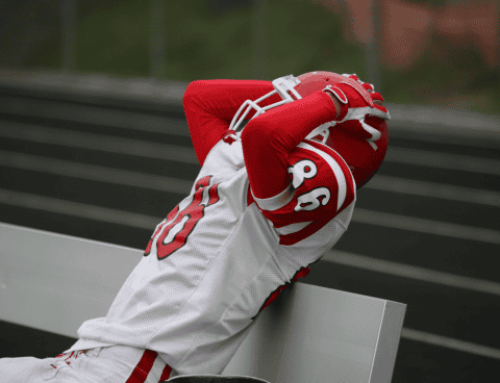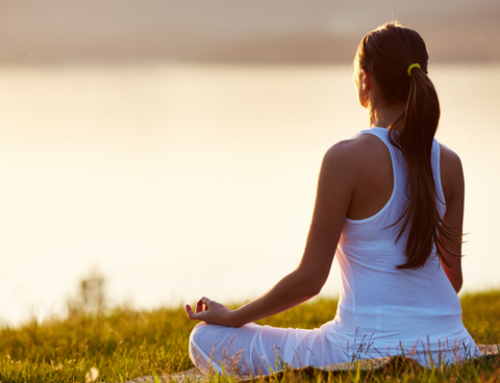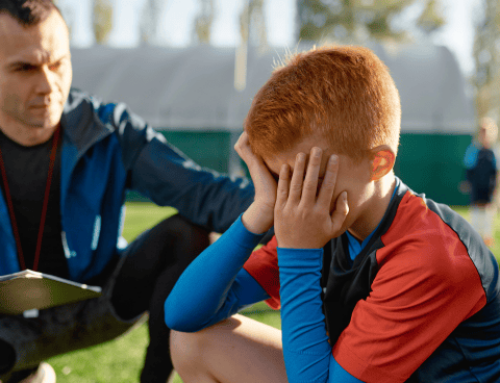5 Ways to Get Better Sleep
Getting enough sleep should be a part of every training plan when it comes to enhancing in-game performance, and although it may not seem as cool as some of the more glamorous recovery methods, it works and works well. This rest allows the body to repair and rebuild itself after hard games and training. Sadly sleep is one of the first things we sacrifice when stress or fun plans come up in other areas of our lives, even though research has found sleep has multiple benefits, including:
- Reducing Fatigue
- Increasing Energy Levels
- Improving Focus and Concentration
- Speeding Up Recovery Time
- Improving Power, Strength, and Stamina
A study at the University of Kansas found that basketball players who lengthened their time asleep improved in a variety of game-related skills (1). The study went on to explain that optimal sleep is essential in optimizing performance in sports. This is an important thing to note, as another recent article has gone on to explain that more than 70% of high school students are not getting enough sleep on school nights (2). Below we will lay out five practices to help you sleep, feel, and perform better.
1) Build Your Cave
One thing I frequently talk to athletes about to enhance their sleep is building their cave. This includes making sure the environment is conducive to getting a great night of rest, and that includes being cool, dark, and quiet. The ideal sleeping temperature is going to be around 68 degrees or below. How you get your room to that temp can be done in a variety of ways, whether that’s with a fan which can also help provide some white noise, an air conditioning unit, or an in-bed cooling device such as a ChiliPad. When sleeping is a must in noisy environments, such as road trips for tournaments, earplugs can be great to drown out outside noise. Another option would be using a fan to create a simple background noise to take attention away from other sounds. Darkness is tremendous in creating the right sleeping environment, and it assists you in falling asleep easier. This includes shutting off the tv and all electronic devices that glow at night. An additional low-cost method of getting into the dark is by using a sleep mask to block out light.
2) Don’t Stress Over Your Sleep Tracker
The amount of technology many of us now have access to monitor and assess our training, health, and activity is great. These tools can be great for motivating us and encouraging us to train, but unfortunately, an overreliance on these tools can lead to potentially harmful stress about what’s going on during our sleep. If you find yourself letting a smartwatch or sleep ring dictate how you feel or how prepared you feel to train, it may be best to give that device a rest for a few nights to reset your mind. Ask anyone who has trained and competed for a while, and they will tell you there will be times you sleep or feel awful and perform great and vice versa. A watch telling you that your day is red doesn’t mean you can’t go out and work to get better. The most important metric of your quantity and quality of sleep is how you feel throughout the day.
3) Take A Nap
I am a big fan of using a nap to offset a rough night of sleep and recommend this to the majority of the athletes I work with. Naps as short as even just 10 or 15 minutes can be beneficial to help you wake up feeling rejuvenated without affecting your sleep later on that night. It is important to avoid taking extended naps for over an hour because you will typically wake up feeling drowsy and sluggish. Another thing to consider is the time of day that you take your nap. Taking your nap too late in the day can negatively affect your coming night’s sleep. Because of this, I recommend avoiding naps after 4 pm. A study recently found that athletes should consider naps of a 20-90 minute duration before 4 pm to benefit a range of outcomes relating to athletic performance (3).
4) Wind Down
Almost everyone has crafted a unique morning routine personalized to them to jumpstart their day. For some, this may include having a cup of coffee, while for others, this may be doing some reading before heading out the door. If you haven’t already, I would recommend taking the time to shape a wind-down routine that signals to your body and mind that the day is done and it’s time to relax for bed. This may include journaling about what’s going on in life or different mindfulness and meditation practices to help relieve life’s stressors, like taking off a backpack after school.
5) Get Consistent
Having a consistent sleep and wake time is one of the most important elements of keeping your body’s internal clock intact in getting a good night’s rest. The schedule that works best for you is going to be dictated by you and your natural rhythms. It’s because of this some people truly are early birds or night owls. Methods as simple as writing down the times you get in and out of bed can help build a better sleep schedule to avoid midday crashes.
Rest and recovery are essential for all athletes, particularly those who make deep investments in training day in and day out. Adding these 5 habits into your daily routine will surely have a profound effect in helping you feel more energized and recovered when it matters.
References
- Mah CD, Mah KE, Kezirian EJ, Dement WC. The effects of sleep extension on the athletic performance of collegiate basketball players. Sleep. 2011 Jul 1;34(7):943-50.
- Zoe Morgan, Leah Worthington and Angela Swartz. “Teen Sleep Deprivation Is a Big Problem, so Schools Are Starting Later.” News, 12 Aug. 2022, https://www.almanacnews.com/news/2022/08/12/teen-sleep-deprivation-is-a-big-problem-so-schools-are-starting-later.
- Lastella M, Halson SL, Vitale JA, Memon AR, Vincent GE. To Nap or Not to Nap? A Systematic Review Evaluating Napping Behavior in Athletes and the Impact on Various Measures of Athletic Performance. Nat Sci Sleep. 2021 Jun 24;13:841-862.
RECOMMENDED FOR YOU
MOST POPULAR
5 Ways to Get Better Sleep
Getting enough sleep should be a part of every training plan when it comes to enhancing in-game performance, and although it may not seem as cool as some of the more glamorous recovery methods, it works and works well. This rest allows the body to repair and rebuild itself after hard games and training. Sadly sleep is one of the first things we sacrifice when stress or fun plans come up in other areas of our lives, even though research has found sleep has multiple benefits, including:
- Reducing Fatigue
- Increasing Energy Levels
- Improving Focus and Concentration
- Speeding Up Recovery Time
- Improving Power, Strength, and Stamina
A study at the University of Kansas found that basketball players who lengthened their time asleep improved in a variety of game-related skills (1). The study went on to explain that optimal sleep is essential in optimizing performance in sports. This is an important thing to note, as another recent article has gone on to explain that more than 70% of high school students are not getting enough sleep on school nights (2). Below we will lay out five practices to help you sleep, feel, and perform better.
1) Build Your Cave
One thing I frequently talk to athletes about to enhance their sleep is building their cave. This includes making sure the environment is conducive to getting a great night of rest, and that includes being cool, dark, and quiet. The ideal sleeping temperature is going to be around 68 degrees or below. How you get your room to that temp can be done in a variety of ways, whether that’s with a fan which can also help provide some white noise, an air conditioning unit, or an in-bed cooling device such as a ChiliPad. When sleeping is a must in noisy environments, such as road trips for tournaments, earplugs can be great to drown out outside noise. Another option would be using a fan to create a simple background noise to take attention away from other sounds. Darkness is tremendous in creating the right sleeping environment, and it assists you in falling asleep easier. This includes shutting off the tv and all electronic devices that glow at night. An additional low-cost method of getting into the dark is by using a sleep mask to block out light.
2) Don’t Stress Over Your Sleep Tracker
The amount of technology many of us now have access to monitor and assess our training, health, and activity is great. These tools can be great for motivating us and encouraging us to train, but unfortunately, an overreliance on these tools can lead to potentially harmful stress about what’s going on during our sleep. If you find yourself letting a smartwatch or sleep ring dictate how you feel or how prepared you feel to train, it may be best to give that device a rest for a few nights to reset your mind. Ask anyone who has trained and competed for a while, and they will tell you there will be times you sleep or feel awful and perform great and vice versa. A watch telling you that your day is red doesn’t mean you can’t go out and work to get better. The most important metric of your quantity and quality of sleep is how you feel throughout the day.
3) Take A Nap
I am a big fan of using a nap to offset a rough night of sleep and recommend this to the majority of the athletes I work with. Naps as short as even just 10 or 15 minutes can be beneficial to help you wake up feeling rejuvenated without affecting your sleep later on that night. It is important to avoid taking extended naps for over an hour because you will typically wake up feeling drowsy and sluggish. Another thing to consider is the time of day that you take your nap. Taking your nap too late in the day can negatively affect your coming night’s sleep. Because of this, I recommend avoiding naps after 4 pm. A study recently found that athletes should consider naps of a 20-90 minute duration before 4 pm to benefit a range of outcomes relating to athletic performance (3).
4) Wind Down
Almost everyone has crafted a unique morning routine personalized to them to jumpstart their day. For some, this may include having a cup of coffee, while for others, this may be doing some reading before heading out the door. If you haven’t already, I would recommend taking the time to shape a wind-down routine that signals to your body and mind that the day is done and it’s time to relax for bed. This may include journaling about what’s going on in life or different mindfulness and meditation practices to help relieve life’s stressors, like taking off a backpack after school.
5) Get Consistent
Having a consistent sleep and wake time is one of the most important elements of keeping your body’s internal clock intact in getting a good night’s rest. The schedule that works best for you is going to be dictated by you and your natural rhythms. It’s because of this some people truly are early birds or night owls. Methods as simple as writing down the times you get in and out of bed can help build a better sleep schedule to avoid midday crashes.
Rest and recovery are essential for all athletes, particularly those who make deep investments in training day in and day out. Adding these 5 habits into your daily routine will surely have a profound effect in helping you feel more energized and recovered when it matters.
References
- Mah CD, Mah KE, Kezirian EJ, Dement WC. The effects of sleep extension on the athletic performance of collegiate basketball players. Sleep. 2011 Jul 1;34(7):943-50.
- Zoe Morgan, Leah Worthington and Angela Swartz. “Teen Sleep Deprivation Is a Big Problem, so Schools Are Starting Later.” News, 12 Aug. 2022, https://www.almanacnews.com/news/2022/08/12/teen-sleep-deprivation-is-a-big-problem-so-schools-are-starting-later.
- Lastella M, Halson SL, Vitale JA, Memon AR, Vincent GE. To Nap or Not to Nap? A Systematic Review Evaluating Napping Behavior in Athletes and the Impact on Various Measures of Athletic Performance. Nat Sci Sleep. 2021 Jun 24;13:841-862.











